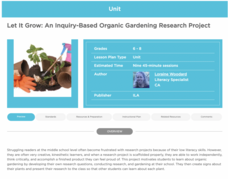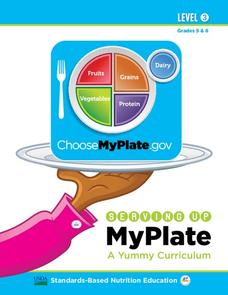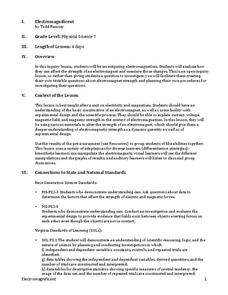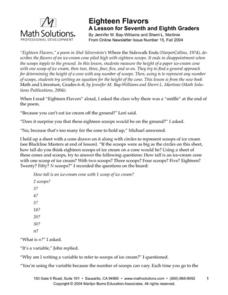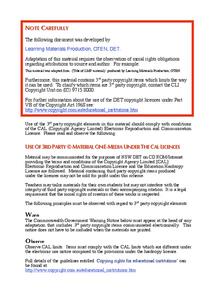New York City Department of Education
Project Based Learning
After reviewing the information included in this resource, you will be an expert in both the definition of project-based learning and how to implement it with your class. Discover and explore thorough explanations, detailed...
ReadWriteThink
Let It Grow: An Inquiry-Based Organic Gardening Research Project
How does your garden grow? An inquiry-based, organic gardening unit asks young scientists to research a vegetable or flower, create an environment for it, and then plant and tend to the seedling. Gardeners develop their own research...
Royal Society of Chemistry
Acids and Bases—Microscale Chemistry
Here's proof that small-scale labs lead to big-time learning. Introduce acid-base interactions to middle school scientists through a microscale chemistry lab. Pupils combine a variety of solutions and use indicators to obtain approximate...
National Science Teacher Association
Middle School Sampler: Science
Focus on inquiry-based learning in your science class with a series of activities designed for middle schoolers. A helpful packet samples four different texts, which include activities about predator-prey relationships, Earth's axis...
Curated OER
Habitat Basics
First graders get out and explore two different habitats to examine how each one meets the needs of the plants and animals that dwell there. They discuss what they've learned about animal habitats as they explore the outdoor environment....
Curated OER
My Personal Wellness
Merge technology and wellness. Class members complete inquiry-based research on a personal wellness issue and create an annotated bibliography, uploading their completed work to their personal wellness websites. Prior to beginning, your...
ReadWriteThink
Webcams in the Classroom: Animal Inquiry and Observation
Boost observational skills with an inquiry-based lesson that takes scholars on a virtual field trip. With help from webcams, learners observe animals in a zoo or aquarium. Observations go into a journal and a discussion is held to review...
Baylor College
Heart Rate and Exercise
What is the relationship among the heart, circulation, and exercise? Your class members will explore first-hand how different physical exercises affect an individual's heart rate. They will begin by learning how to measure their own...
C3 Teachers
African American Voices and Reconstruction: What Does It Take To Secure Equality?
High schoolers research the 13th, 14th, and 15th Amendments, as well as other primary source documents, to determine Reconstruction's impact on the North and South. The 34-page inquiry-based lesson includes a staging question and...
Wordpress
Social Issues and Art Inquiry Project
Connect art to social issues with a extended inquiry project. Individuals or small groups select a social issue and a type of art to explore. They complete a KWL chart for both the social issue and the art strand and take time to create...
US Department of Agriculture
Serving Up My Plate
Within three nutrition-themed, inquiry-based learning opportunities, pupils take notice of their eating habits; delve deep into the five food groups, gain experience in planning meals, participate in a taste test, and explore ads...
NOAA
Biological Oceanographic Investigations – Call to Arms
How many simple machines does it take to make a robotic arm? An inquiry-based lesson plan explores that topic and challenges pupils to build a robotic arm that can stretch, turn, and more. A few questions help guide them in the...
STEM for Teachers
Electromagnificent
This physics pun really hertz, but this STEM lesson plan can help. The inquiry-based activity has young scientists create a testable question about electromagnetic strength; plan and implement their own experiments; and record and...
Astronomical Society of the Pacific
Getting Ready for the All American Eclipse!
Give your pupils a front row seat at the biggest light show in the sky this year! In addition to admiring the total solar eclipse, young astronomers can explain the phenomenon with a little help from an inquiry-based instructional...
Great Books Foundation
Discussion Guide for Little Women
Start with the question in mind with a discussion activity on Louisa May Alcott's Little Women. With four focus questions, note-taking prompts, and discussion points, readers practice answering thematic questions based on textual evidence.
Curated OER
Insect Investigation
Investigation is a brilliant way to spark scientific inquiry. First graders will identify, research, and report what they have learned about a mysterious bug found on the playground. They will use multimedia resources for research and...
Mathematics Vision Project
Quadratic Functions
Inquiry-based learning and investigations form the basis of a deep understanding of quadratic functions in a very thorough unit plan. Learners develop recursive and closed methods for representing real-life situations,...
Marilyn Burns Education Associates
Eighteen Flavors
Your learners will be tantalized by this inquiry-based, collaborative activity as they discover how to write an equation that represents the height of an ice cream cone. Given the scenario based on the poem, "Eighteen Flavors," and...
Carolina K-12
How Do I Pre-Register and Vote in North Carolina?
Did you know that in some states your pupils can pre-register to vote? Teach the advantages to pre-registering and engage the classroom in an intriguing discussion about youth voting trends. Class members participates in a live polling...
Education Development Center
Micro-Geography of the Number Line
Young mathematicians dive into the number line to discover decimals and how the numbers infinitely get smaller in between. They click the zoom button a few times and learn that the number line doesn't just stop at integers. Includes...
Millennium Schools
Lifestyle Chemistry
My name is Bond, Hydrogen Bond. Written for distance scholars working on chemistry at the high school level, the lesson includes eight weeks worth of material divided into six parts: substances you use, mixing it up, your skin, what's...
Serendip
Structure and Function of Cells, Organs and Organ Systems
Cells of different organs have unique cell functions. Learn how cell functions vary depending on their roles in the body using an inquiry-based activity. Scholars analyze the cell structure to make comparisons to its functions, allowing...
Core Knowledge Foundation
A Time for All Seasons - Spring
Celebrate the arrival of spring with this fun primary grade science unit. Engaging young scientists with a variety of hands-on activities and inquiry-based investigations, these lessons are a great way to teach children about...
Digital Public Library of America
African American Soldiers in World War I
Finding good primary source materials to support any study of history can be a challenge and time-consuming. A set of 11 primary source letters, images, and text excerpts provide young historians with an opportunity to sharpen their...
Other popular searches
- Inquiry Based Learning Maths
- Inquiry Based Learning Plant
- Inquiry Based Learning Science
- Inquiry Based Learning Space
- Math Inquiry Based Learning

